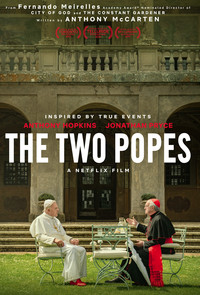| SHADOWS ON THE WALL | REVIEWS | NEWS | FESTIVAL | AWARDS | Q&A | ABOUT | TALKBACK | |||||||||||||
 Shadows off the beaten path Shadows off the beaten pathIndies, foreigns, docs, revivals and shorts...
On this page:
SORRY WE MISSED YOU |
SPELL |
THE TWO POPES
| |||||||||||||
| See also: SHADOWS FILM FESTIVAL | Last update 30.Oct.19 | |||||||||||||
|
Sorry We Missed You Review by Rich Cline | 
| |||||||||||||
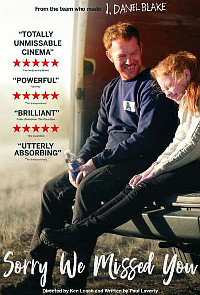 dir Ken Loach scr Paul Laverty prd Rebecca O'Brien with Kris Hitchen, Debbie Honeywood, Rhys Stone, Katie Proctor, Ross Brewster, Alfie Dobson, Charlie Richmond, Julian Ions, Nikki Marshall, Mark Birch, Harriet Ghost, Linda E Greenwood release UK 1.Nov.19 19/UK BBC 1h41 CANNES FILM FEST TORONTO FILM FEST |
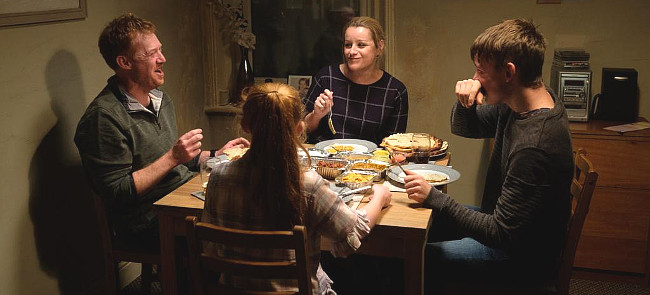 Ken Loach and Paul Laverty continue to unpick British society with this emotional depiction of zero-hours culture. They capture the relentless onslaught on people stuck at the wrong end of the financial chain, working far too hard for far too little. It's an angry rant of a movie, unafraid to travel into dark corners. But it remains grounded in its honest depiction of real-life situations and earthy characters. In Newcastle, Ricky (Hitchen) convinces his wife Abby (Honeywood) to sell her car so he can buy a van and deliver parcels, although now she must travel by bus in her work as a carer for the housebound. Both are freelance, paid by the job not the hour, so they work achingly long days just to meet their strict targets. And because they have less time at home, they begin to lose track of their arty-surly teen son Seb (Stone), who begins to get in serious trouble, and their bright, observant 11-year-old daughter Lisa (Proctor). They only changed jobs to get on top of things, to save up to buy a house instead of renting, and to have enough cash for Seb's university. But it's not going that way, simply because they work too many hours to breathe. They also never get a break, as trouble arises on all sides, resulting in docked wages and penalty fines they're powerless to contest. It's a bleak situation, and it's instantly relatable because millions of people are living under this form of slavery. The fresh-faced actors are excellent. The way they interact is authentically awkward, sometimes harsh as quiet discussions devolve into full-on brawls. Honeywood is terrific as the peacemaker who can't bear discord between people she loves. Hitchen plays a likeable guy whose offhanded charm fades as he is put through the wringer. And both Stone and Proctor add revealing angles to their roles as young people deeply affected both by their parents' struggle and the difficulties in society at large. Yes, the film sometimes feels preachy, simply because its approach is so expansive, broadening and deepening to show the seemingly endless fallout from a system that sounds like such a positive idea. So even if the film feels unforgiving, Loach and Laverty are making a very important point, connecting the dots in an economy that has become increasingly strained in the wake of the 2008 crash. And this is the truth for a the vast majority of people, not a marginal few.
| ||||||||||||
|
Spell Review by Rich Cline | 
| |||||||||||||
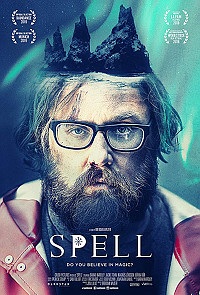 dir Brendan Walter scr Barak Hardley prd Jon Lullo, Brendan Walter, Barak Hardley, Katy Stoll, Eleanor Wilson with Barak Hardley, Jackie Tohn, Magnus Jonsson, Birna Run Eiriksdottir, Bryndis Haraldsdottir, Gunnar Kristinsson, Andri Freyr Sigurpalsson, Tom Wright, Stacey Moseley, Michael Nanfria, Michole Briana White, Knutur Haukstein Olafsson release US 1.Nov.19 18/US 1h27 |
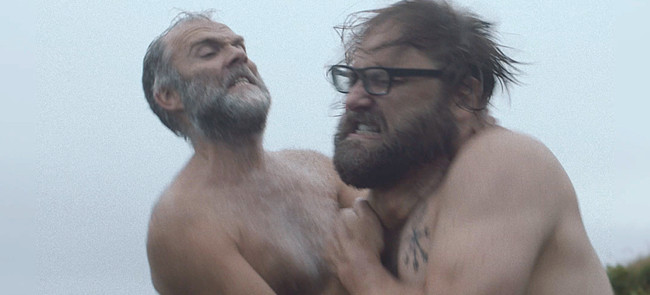 Loose and offbeat, this comical odyssey sends a messy American into mythological nuttiness in Iceland. Since he's generally unstable, there's the sense that what happens to him may largely be all in his mind, but the filmmaking has such a matter-of-fact tone that it's easy to sympathise with him. So even as things get increasingly bizarre, the story remains grounded in realistic thoughts and feelings. After his fiancee (Tohn) dies, woolly American cartoonist Benny (Hardley) impulsively heads to Iceland. At the magic museum, he learns about the mythical Loftur and his powerful spell. Running out of his OCD meds, he turns to alcohol, and in a bar Inga (Eiriksdottir) convinces him to take a tour with the eccentric Steindor (Jonsson). After an awkward night with Inga, which includes getting a stave tattoo, Benny heads into the countryside with Steindor, visiting a glacier and hot pool. Then things turn seriously crazy, and he's sent on his own quest, following the runestones. The film features as many quirks as Benny himself. A bundle of jitters, he compulsively licks metal objects and other surfaces. And Steindor is a hilariously gruff, no-nonsense tour guide, taking Benny around spectacular landscapes and challenging his idea of what's real and what's supernatural. And as Benny follows what seems to be a preordained journey to his destiny, he's also looking into himself and being forced to confront his lingering grief. Is it too much to ask that Loftur's legendary spell does its magic? Or should Benny just give into it all? Actor-writer Hardley gives Benny a likeably ramshackle personality as a cheerful dork who resists pretty much everything that comes his way, but gives in eventually. So this trip takes him both into the Icelandic wilderness and deeper into his own tormented soul (cue lots of flashbacks). His reactions along the way are enjoyably dismissive, but he tries to connect with the people he meets, and is frustrated that he ends up alone on this quest. Indeed, the sparky supporting cast remains mainly in the film's margins. The film's freewheeling sensibility intriguingly subverts the carefully set-out story structure, as it weaves extended flickering memories among the picturesque locations through which Benny is trekking. Along the way, things get very dark for Benny, especially as he is also struggling against a compulsion to stick something sharp in his ear. Where this goes is deeply unpredictable, and also both emotionally complex and powerfully provocative.
| ||||||||||||
|
The Two Popes Review by Rich Cline | 
TORONTO FILM FEST 
| 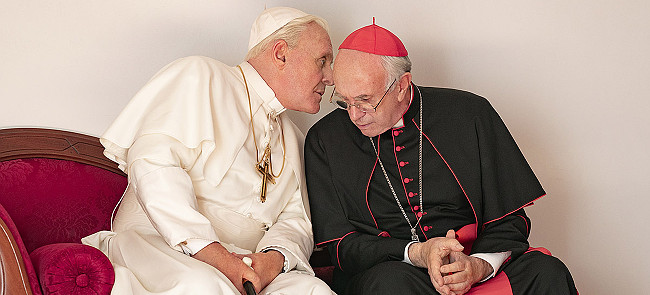 Clever writing and directing, plus two titanic performances, make this fact-based drama both challenging and entertaining. So even if Anthony McCarten's script noticeably dodges some key issues, it's sharp enough to provoke thought, adding humour and resonance to a movie that hinges on a series of conversations. Of course, when it's Jonathan Pryce and Anthony Hopkins who are talking (in four languages), it's impossible to look away. In the 2005 papal conclave, cardinals Ratzinger (Hopkins) from Germany and Bergoglio (Pryce) from Argentina represent tradition and reform, respectively. Ratzinger becomes Pope Benedict, but struggles with criticism over his old-world beliefs and the explosive child abuse scandal. In 2012 he summons Bergoglio to Rome for advice: he plans to resign from the papacy. Their conversations centre on their diverging opinions about theology and social justice, but they find common ground when it comes to forgiveness. This is especially meaningful for Bergoglio, who is haunted by his decisions during Argentina's Dirty War in the 1970s. These thoughts play out in a vivid stream of flashbacks as Bergoglio (played by Minujin as a young man) remembers key moments in his life. These sequences liven up the conversations, even if they pointedly avoid Ratzinger's past (there's one massive hint). Meirelles directs in a lively way that finds humour in most scenes, including witty moments involving football, tango, pizza and Dancing Queen. And Pryce and Hopkins are so well-cast that Meirelles can edit between them and the real-life men they're playing. With his back-story, the excellent Pryce has a lot to work with, making Bergoglio remarkably affable as he connects effortlessly with people across social strata. He'd rather live like a normal person, and even eschews ceremonial papal robes ("The carnival is over"). Hopkins doesn't get quite this level of depth, as the script pointedly glosses over Ratzinger's past, making him a twinkly, likeable old man who is having a crisis of conscience. Because the central themes are forgiveness and change, there's a sense that the filmmakers are giving Ratzinger a pass. So Bergoglio makes more pointed comments, explaining why he wants to resign as a cardinal: "I no longer wish to be a salesman for a product I can't endorse." He speaks about how the church needs to change, as it has always done, and stop both ignoring world events and remaining silent about abuse. The film is bookended with the next papal conclave, followed by a coda that offers both a chuckle and some hope.
| 
See also: SHADOWS FILM FESTIVAL © 2019 by Rich Cline, Shadows
on the Wall
HOME | REVIEWS | NEWS | FESTIVAL | AWARDS
| Q&A | ABOUT | TALKBACK | | ||||||||||

